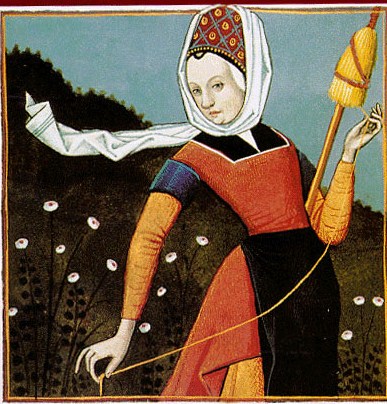Throughout Germanic folklore, Frīge and her epithets are connected to spinning and foreknowledge. These two attributes seem to be interwoven (pun intended), her spinning or weaving acting as a metaphor for her both knowing and thus being able to alter the fate of all beings, as alluded to in Norse sources.
“Mad art thou, Loki, | that known thou makest
The wrong and shame thou hast wrought;
The fate of all | does Frigg know well,
Though herself she says it not.”
(Lokasenna. Bellows trans.)
Frīge’s role as a goddess associated with wyrd is also touched upon, albeit loosely when she outwits Wōden in the origin myth of the Langobards.
“The Winnilies lived on an island called Scadanan. They were ruled by two chieftains, called Ybor and Agio, and their mother, Gambara. The Vandals moved in with their army, and the two Vandal chieftains, Ambri and Assi, ordered the Winniles either to pay or to engage with them in battle. The Winniles chose to fight their opponents. Then the Vandals entreated Godan to grant them victory, and he replied that he intended to bestow victory on those whom he first saw at sunrise. Not to be outdone, Gambara approached Godan’s wife, Frea, for advice. She suggested that the warriors of the Godan’s wife should line up at sunrise, accompanied by their wives with their hair let down and held around their faces to resemble beards. When day broke, Frea turned around the bed of the still sleeping Godan to face the east and then woke him. On seeing the Winniles lined up, Godan exclaimed, Who are these long-bearded ones?” Frea then commented that since he had given the Winniles a name, he had to give them victory. Consequently the Winniles defeated the Vandals and were thenceforth called ‘Langobards’.”
(Origo gentis Langobardorum)
Although the events in Origo gentis Langobardorum could be viewed as a simple case of Frea’s guile and crafty nature, it can also be viewed as loose evidence of Frīge’s gift of foreknowledge outside of the Icelandic sources.
The Norse and Langobardic sources are not the only places where a Frīge-like goddess is connected to spinning. In Alemannic regions Perchta or Berchta is frequently depicted as an old woman, connected to the spinning of flax. William P. Reaves’ Odin’s Wife: Mother Earth In Germanic Mythology is replete with regional tales concerning Perchta punishing those who shirk their spinning duties.
“She may visit the spinning rooms on the night before Twelfth-day, tossing empty reels in through the window with the demand that they all be filled in a short period of time. If her demands are not met, she breaks and befouls the flax. From Langendembach in the Thuringian Forest comes a story that tells of an old woman who refused to quit working on the eve of Twelfth-day, complaining “Perchta brings me no shirts, I must spin them myself.” At that, the window flew open and Perchta threw some empty spools into the room demanding that they all be spun full in an hour’s time. Terrified, the spinster spun a few rounds on each spool, and then threw them all into a nearby brook. With this, Perchta was appeased.”
Although many of the tales concerning Frau Perchta have been transformed and censored by Christianity, often making her appear as a sinister witch-like character, her connections to spinning and ultimately the web of wyrd remains intact, creating a possible tether to Frīge’s importance as a goddess associated with causality and fate.

Honestly, as a hand spinner, I can attest to the trance that spinning puts one into. If I was focused on anything other than making quality even thread, I could do a lot of powerful magic. I can literally feel the power flowing through my fingers. Same for weaving – it’s a powerful way to produce trance. And a powerful way to produce magical results.
LikeLiked by 2 people